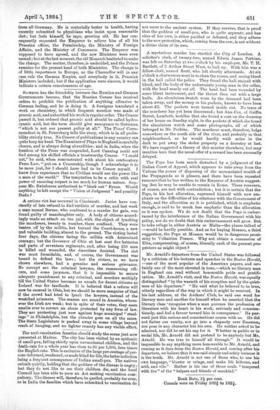So warm has the friendship between the Russian and German
Governments become, that the Russian Censor has received orders to prohibit the publication of anything offensive to German feeling, and he is doing it. A foreigner translated a -work on chemistry, in which frequent mention was made of prussic acid, and submitted his work in regular order. The Censor passed it, but ordered that prussic acid should be called hydro- cyanic acid, lest the term should give annoyance to Germans, "which is not our present policy at all." The Times' Corre- spondent in St. Petersburg tells the story, which is in all proba- bility strictly true. No Censor of publications in any country can quite keep his head. The E xaminer of Plays in England is carefully chosen, and is always doing absurdities ; and in India, when the freedom of the Press was suspended, Lord Canning could not find among his skilled officials a trustworthy Censor. "I could not," he said, when remonstrated with about his confiscatory Press Law, " put on a Censorship, though I acknowledge it to be more just, for I should have had to be Censor myself. I know from experience that no Civilian would use the power like a man of the world." The temptation to be a critic with real power of ensuring respect is too much for human nature. Sup- pose Mr. Swinburne authorised to "block out" Byron. Would anything be left except the "Vision of Judgment" and possibly Duda P














































 Previous page
Previous page